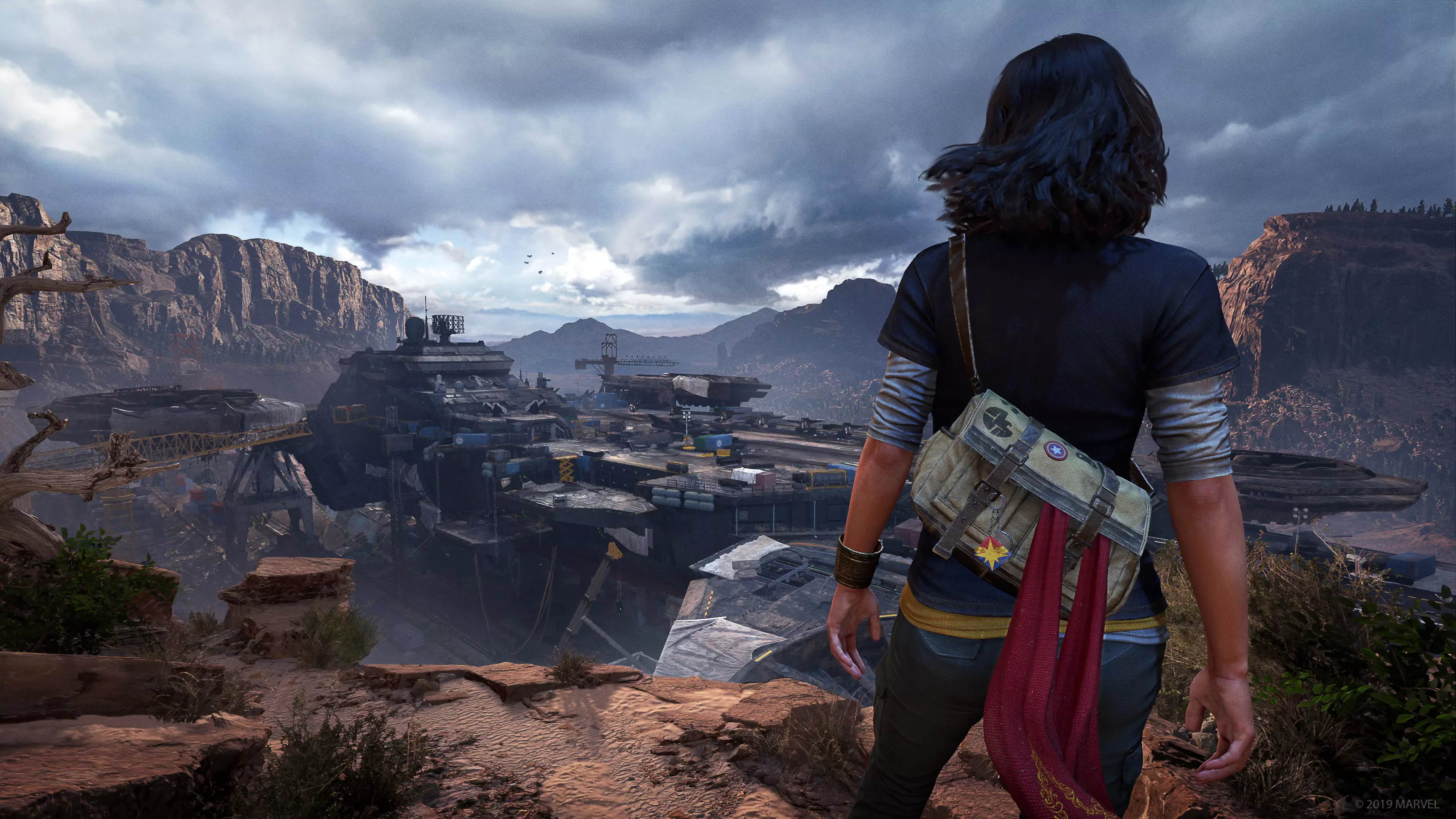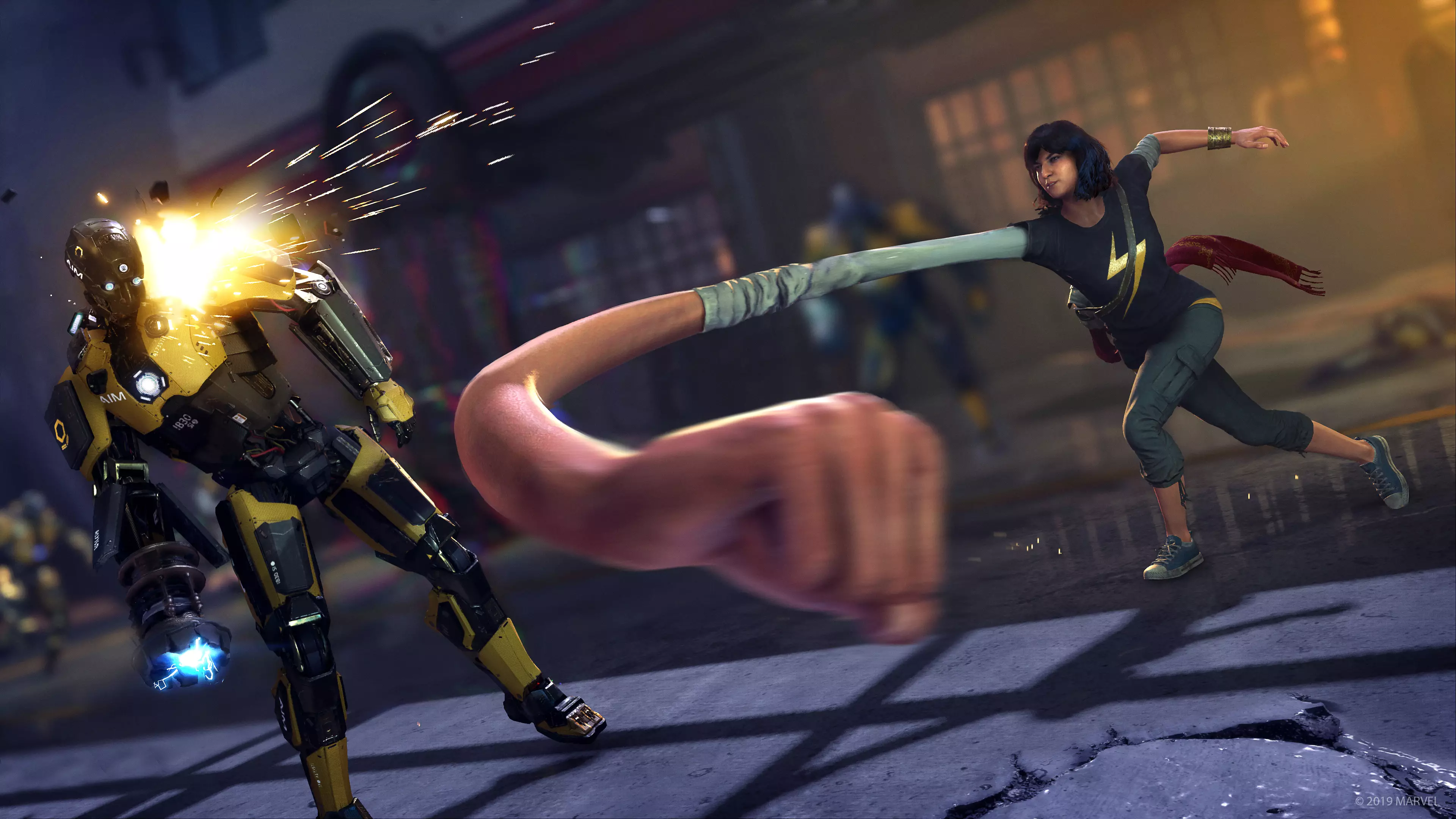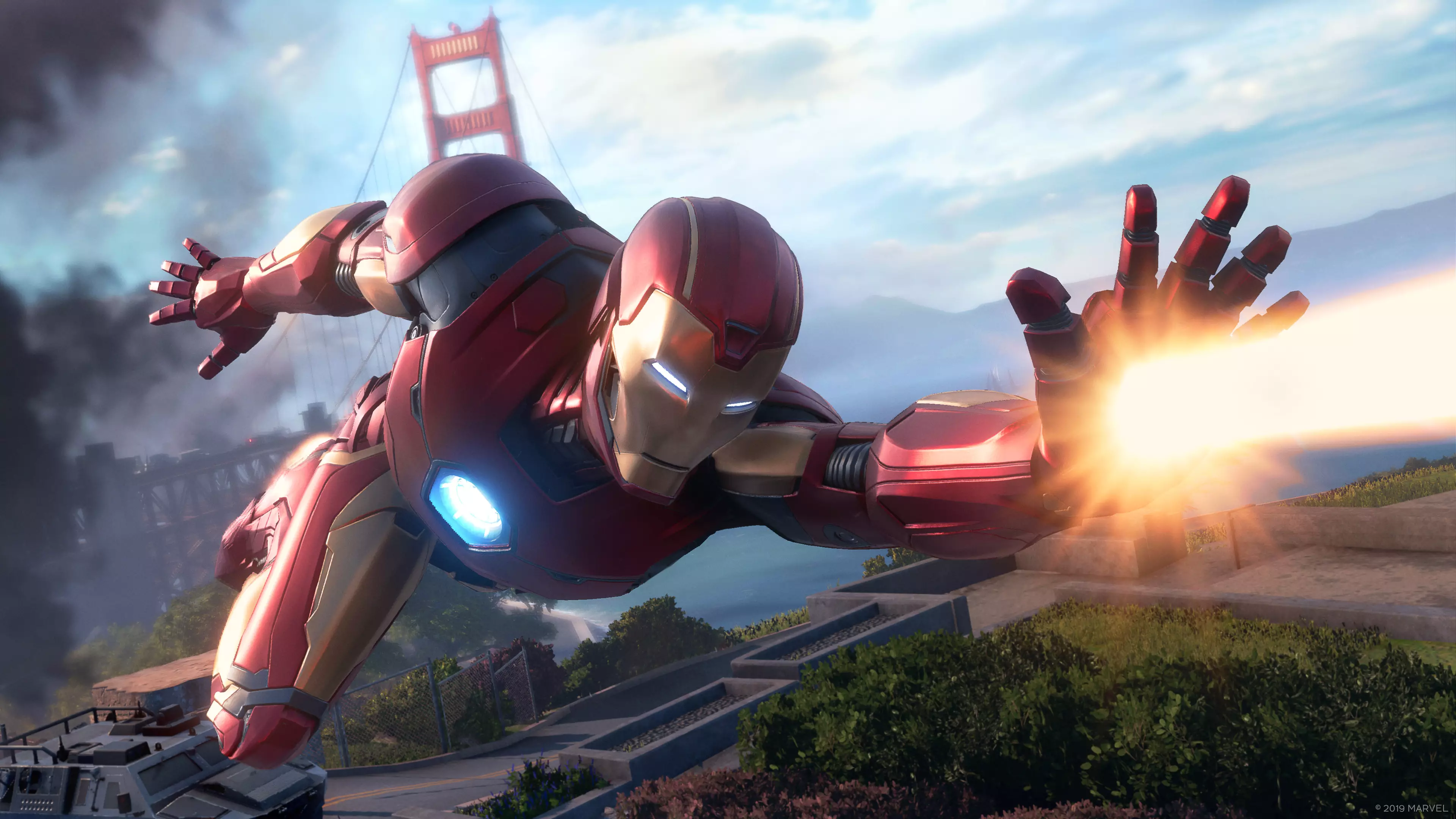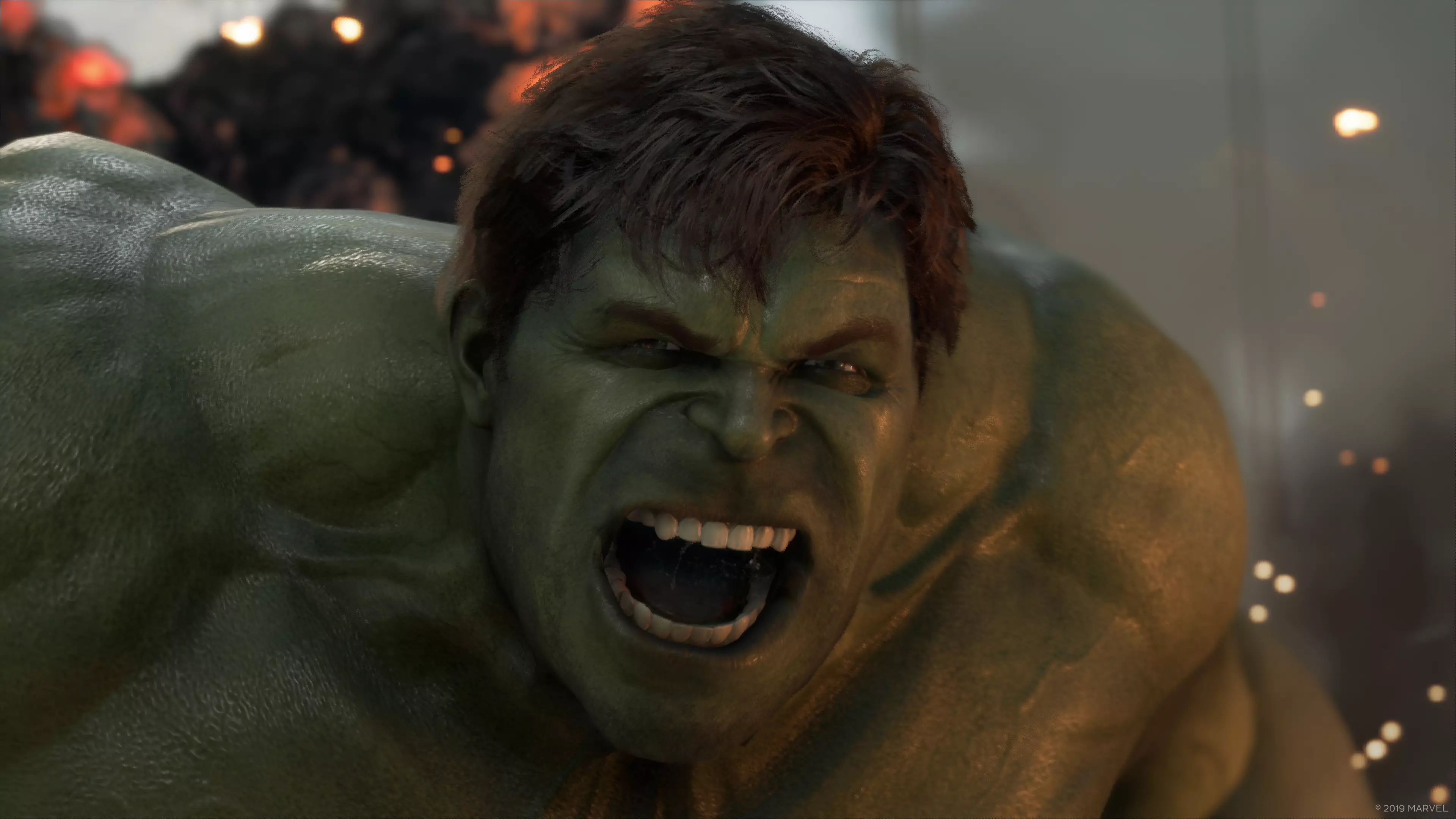
Properly unveiled at E3 this year, Crystal Dynamics' Marvel's Avengers is an ambitious blend of single-player and co-op that lets you play as six different heroes at launch. We've played the game twice now, once at Gamescom and last week at EGX, trying out all six heroes: Captain America, Hulk, Kamala Khan, Iron Man, Black Widow and Thor.
After our most recent session we spoke with Scot Amos, Crystal Dynamics' head of studio, about the newly revealed Kamala Khan aka Ms. Marvel, how she fits into their Avengers story and what links the game has to Insomniac's PS4-exclusive Marvel's Spider-Man.
Marvel's Avengers is set in its own version of the comic universe in which, after a disastrous attack on San Francisco where Captain America appears to die, the superhero team has disbanded and gone its separate ways. You start the game as Kamala Khan, an Inhuman polymorph who can grow to multiple times her natural size and use her stretchy, flexible limbs to pummel the stuffing out of enemies. Over the course of the single-player campaign you'll unlock the other Avengers, who each have their own tailor-made Hero Missions, alongside War Zone Missions which are built to be played in co-op, where everyone can play as the hero of their choice.
As you level up your heroes, you'll unlock skill points that you can invest in the skill tree to define the abilities of your hero - turning Thor into an aerial warrior calling down lightning attacks on his enemies, or into more of a melee slugger. You'll also acquire gear that will augment your attacks, adding new effects and buffs to your moves.
Jules: Was Kamala always part of the plan?
Scot Amos: Right from the beginning. When we first announced [the game] in January 2017, when we first put a teaser out there, it had the voice of Kamala. Before we announced anything, we had the VP of creative, our creative director Shaun Escayg, and senior creative director Noah Hughes sit down and figure out what we needed to do to bring a lens into our world, a world that feels like you know it already. There's all these other tales from comics, toys, other games, and movies. We need to do our own version of these heroes in our world. And Kamala has the brilliant opportunity to be both a fresh face and lens. From the beginning, we wanted a character that players could sit there and say, "I'm a super fan just like her. I'm gonna figure out who I'm meant to be [in the game], just like her."
Jules: You teased the game back in January 2017, but didn't actually reveal what it was until E3 this year. Why did it take so long?
Scot Amos: I will say this: everything has a plan. We work closely with our collaborators at Marvel, trying to figure out what's the right time to do what announcements, because it's a much bigger world than one game, right? Think of this epicness of 80 years of Marvel, and that history - they know these heroes and these fans. We work very smartly to make sure when we put what out there.
One of the things we've learned, and I've done this business for a long time, [is that] I can tell you everything about this game today and you'll ask, "Okay, so who's coming after launch? What's the next region that's coming?"
Jules: But it did lead to some confusion after the game reveal at E3, with few people knowing quite what the game was.
Scot Amos: We had this experience with Tomb Raider back in 2013. When we announced a reimagined Lara Croft, people looked at us like, "Why would you change Lara Croft, she's fine. Leave her alone." It took a few months to get over that hurdle from "No, no, this is still Lara Croft," to, "But it's this new version, this new vision". It took us almost the same amount of time it's taken us this time. It was important for us to just stage it right and be able to get people on board.

Jules: Both times I've played now, I've been taken by how much personality comes through in the way my characters fight. Not just using their iconic weapons, but their movements.
Scot Amos: Thank you. Our combat team is amazing. Vince Napoli, our lead combat designer, came from God of War and it's something that he and his team have done a brilliant job of, taking those heroes and saying, "What's their core?"
Bill Rosemann, creative director at Marvel Games, he always helped us figure out the why of each hero. Not the what or the how, but the why. Why does Thor fight this way? Why does Kamala fight this way. You start wrapping that answer around everything else. Take Kamala, she's a teenager, she has a great sense of humour, she has style, and she has this inhuman ability she's still trying to master. She's a little bit out of control; this fun, crazy, "Oh my gosh, she can do all kinds of things" character. It's a fine art for us to find out why these all tie together. But I think the guys did a brilliant job of making that personality in all of them shine through their combat. Hulk's a brawler, Thor is a god and has that kind of egotistical way of fighting; versus Tony whose melee attacks look like he's posing. They've done a great job of capturing the personalities in the combat.
Jules: And that continues as you expand them, through skills and gear?
Scot Amos: You're literally exposing their personality as you're exposing their skills, getting new gear, as you tune them and choose how you want to play with them. Even if you make Thor an aerial lightning guy or more a melee attack guy, it's okay, they're both Thor but it's just that I've taken mine down a certain path versus yours.

Jules: You've said before that Hero Missions progress the story and War Zone ones expand it, but what exactly does that mean?
Scot Amos: If you look at the hero missions, they're the campaign - a complete arc through the hero missions of a full campaign story - beginning with Kamala, reassembling the Avengers, and all these characters' threads tie together. That's one complete package that ends, but that's not the end of the game, that's the end of the campaign. Then you have, if you want to call it Act Four, where the rest of this world is always constantly evolving, updating. The campaign sets up the state of the world for more things to come, both stuff that's available on day one when you get the game, but also all the other regions, heroes, and stories we're going to add to it. On the War Zone side, all those missions that happen along the way of the campaign, they actually keep feeding into that fourth act, but they're in parallel with the main campaign.
Jules: So what would be an example of that? Do the single-player missions have direct links to particular War Zone Missions, giving another perspective on the same events?
Scot Amos: I'll give you a more explicit example. As Kamala, once you find Bruce Banner, we figure out that next stage for him. Once you have Bruce there are new missions and when you're going down that path, there's things that you start opening, unlocking, that actually fill in gaps in the narrative like what's happened in the last five years, where he's been, and what he's been doing. So these War Zones open up, and those pieces of narrative explain those missions.
Jules: How did the success of Insomniac's Marvel's Spider-Man impact development?
Scot Amos: I would say it educated, not impacted. Every game that comes out that has anything to do with co-op, or cool characters, or fun combat, we take all of that stuff and use it. We love competitors who go off and try something that will push us to be even better, to do things our own way. So I would definitely say that we've learned from everybody.
Jules: Though, as they were also working on a Marvel game, did you talk with each other?
Scot Amos: We're separate. They had their game, we have our game. We all know each other as developers at some level, but Marvel (Games) is very good at being a centre point, keeping us separate like church and state. We look at it as Marvel being those great collaborators: they knew more than we did, we never got to see Spider-Man, that was their product from a different company; but for us, Marvel got to see it, right, because Marvel's at the centre of that game, too. Marvel could give us feedback on our heroes or how things played, but they already had instincts from [the other games]. That's been the fun thing having them as collaborators, they're gamers who love these heroes, they're able to give us that feedback very honestly and openly, collaboratively. We see them every week. We have these guys in our office, every week we send them builds. It's not an old-school licensing deal like, "Oh, just stay away. We'll come back to you when the game's done." We desperately want to have that collaboration very much hand in glove.
Jules: So, just to clear up any confusion, Marvel's Avengers and Marvel's Spider-Man...
Scot Amos: They're separate. They're separate worlds, separate universes.

Jules: Why do you think there was that confusion?
Scot Amos: It's timing. Endgame, from the movie side, had just finished and we were revealed a few months later, so it's fresh on everybody's mind and then we come up. It's like, "okay, is this connected? It says Avengers on it, but is it Avengers Avengers?" And I think there's a simplified version where a lot of folks want to say, "Oh, It's always the same." When people first heard about the game, there was an expectation of, "Oh, of course, they're just based on the movies" - but that's not this relationship. From the beginning we've been saying: you've got movies, games, TV shows, comic books, toys, even rides, for that matter; you have all this spectrum of stuff for Marvel and for Avengers, and there's all these different stories. That's the thing that's been hardest to get across to people from the beginning: we need to have our own space to do our thing with these characters.
Jules: There are familiar beats, like Banner being trapped as Hulk that appears in both the comics and the films. But it's about the context of how you've used that beat?
Scot Amos: Exactly. It's our way of getting there and then what it what it means to our story. Coming back to that why: why do we do this? It's not a rip-off and not a parody, either. It's inspiration. Bill Rosemann still takes comic books and puts post-it notes on pages and sends them to us and says, "This is a cool idea. Do you want to use this?" And that's magic for us.
Jules: Thank you.
We were invited to play Marvel's Avengers by Virgin Media, who provided the first UK play of the game at EGX this year
Featured Image Credit: Square EnixTopics: Marvel's Avengers, Square Enix